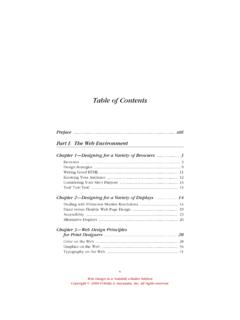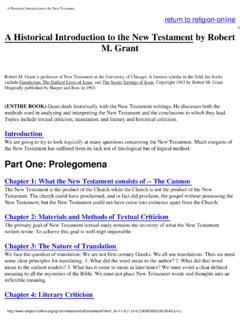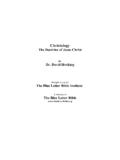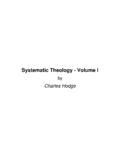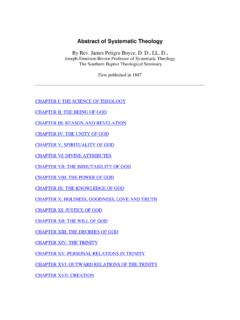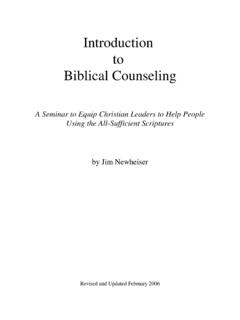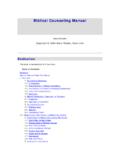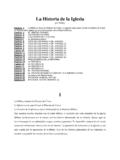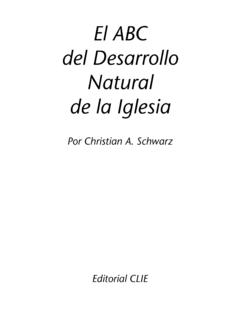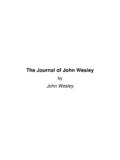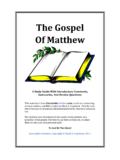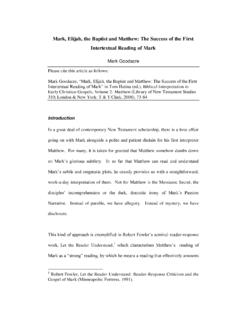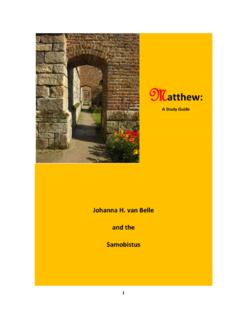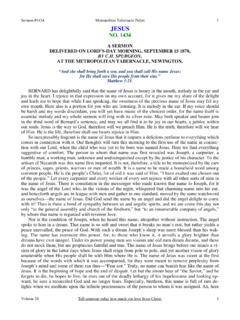Transcription of Catena Aurea - Gospel of Matthew - The NTSLibrary
1 Catena Aurea - Gospel of MatthewbySt. Thomas AquinasAbout Catena Aurea - Gospel of MatthewCatena Aurea - Gospel of MatthewTitle: :Aquinas, Thomas, Saint (1225?-1274)Author(s):Whiston, William (Translator)Grand Rapids, MI: Christian Classics Ethereal LibraryPublisher:London: and J. Rivington, 1842 Print Basis:2000-07-09 Date Created:(tr. William Whiston)General Comments:All; Classic; Bibles;CCEL Subjects:BS2555LC Call no:The BibleLC Subjects:New TestamentSpecial parts of the New TestamentTable of Contentsp. iiAbout This Book..p. 1 Title Page..p. 2 Gospel of Matthew ..p. 2 Chapter 1..p. 41 Chapter 2..p. 63 Chapter 3..p. 83 Chapter 4..p. 104 Chapter 5..p. 152 Chapter 6..p. 192 Chapter 7.
2 P. 215 Chapter 8..p. 240 Chapter 9..p. 262 Chapter 10..p. 292 Chapter 11..p. 312 Chapter 12..p. 346 Chapter 13..p. 377 Chapter 14..p. 397 Chapter 15..p. 415 Chapter 16..p. 434 Chapter 17..p. 450 Chapter 18..p. 470 Chapter 19..p. 490 Chapter 20..p. 508 Chapter 21..p. 534 Chapter 22..p. 555 Chapter 23..p. 578 Chapter 24..p. 610 Chapter 25..p. 632 Chapter 26..p. 676 Chapter 27..p. 706 Chapter 28..p. 721 Indexes..p. 721 Index of Scripture References..p. 724 Index of Scripture Commentary..p. 724 Greek Words and Phrases..iiiSt. Thomas AquinasCatena Aurea - Gospel of Matthewp. 725 Hebrew Words and Phrases..p. 727 Index of Pages of the Print Edition..ivSt. Thomas AquinasCatena Aurea - Gospel of MatthewSt.
3 Thomas AquinasCatena Aurea (Golden Chain)Volume and J. RivingtonLondon, 1842St. Thomas AquinasCatena Aurea - Gospel of Matthew9 Ver. 1. The book of the generation of Jesus Christ, the Son of David, the Son of , Ez, i. 5. Hier. Prolog. in Com. in Matt.: The face of a man (in Ezekiel s vision) signifiesMatthew, who accordingly opens his Gospel with the human genealogy of : By this exordium he shews that it is the birth of Christ according to the flesh that he hasundertaken to , Hom. in Matt., Hom. i: Matthew wrote for the Jews, and in Hebrew [ed. note: Itseems to be the general witness of antiquity that there was a Hebrew copy of St. Matthew s Gospel ,whether written before or after the Greek.]
4 This Hebrew copy was interpolated by the Ebionites.];to them it was unnecessary to explain the divinity which they recognized; but necessary to unfoldthe mystery of the Incarnation. John wrote in Greek for the Gentiles who knew nothing of a Sonof God. They required therefore to be told first, that the Son of God was God, then that this Deitywas : Though the genealogy occupies only a small part of the volume, he yet begins thus, Thebook of the generation. For it is the manner of the Hebrews to name their books from that withwhich they open; as Ordinaria: The full expression would be This is the book of the generation; but this is ausual ellipse; The vision of Isaiah, for, This is the vision.
5 Generation, he says in the singular number, though there be many here given in succession, asit is for the sake of the one generation of Christ that the rest are here , Hom. in Matt., Hom. ii: Or he therefore entitles it, The book of the generation, because10this is the sum of the whole dispensation, the root of all its blessings; viz. that God become man;for this once effected, all other things followed of : He says, The book of the generation of Jesus Christ, because he knew it was written, The book of the generation of Adam. He begins thus then, that he may oppose book to book, thenew Adam to the old Adam, for by the one were all things restored which had been corrupted bythe , Hier. Comm.
6 In Matt., ch. 1: We read in Isaiah, Who shall declare His generation? [Isa53:8] But it does not follow that the Evangelist contradicts the Prophet, or undertakes what hedeclares impossible; for Isaiah is speaking of the generation of the Divine nature; St. Matthew ofthe incarnation of the : And do not consider this genealogy a small thing to hear: for truly it is a marvellous thingthat God should descend to be born of a woman, and to have as His ancestors David and : Though any affirm that the prophet (Isaiah) does speak of His human generation, weneed not answer to his enquiry, Who shall declare it? - No man; but, Very few; becauseMatthew and Luke Thomas AquinasCatena Aurea - Gospel of MatthewRabanus: By saying, of Jesus Christ, he expresses both the kingly and priestly office to be inHim, for Jesus, who first bore this name, was after Moses, the first who was leader of the childrenof Israel; and Aaron, anointed by the mystical ointment, was the first priest under the , Quaest.
7 Nov. et Vet. Test. q. 40: What God conferred on those, who, by the anointing ofoil were consecrated as kings or priests, this the Holy Spirit conferred on the Man Christ; addingmoreover a purification. The Holy Spirit cleansed that which taken of the Virgin Mary was exaltedinto the Body of the Saviour, and this is that anointing of the Body of the Saviour s flesh whenceHe was called Christ.[ed. note: This passage is from a work commonly ascribed to Hilary the Deacon. The Fathers bearout its doctrine; Since the flesh is not holy in itself, therefore it was sanctified even in Christ,the Word which dwelt in it, through the Holy Ghost, sanctifying His own Temple, and changing itinto the energy of His own Nature.]
8 For therefore is Christ s Body understood to be both holy andhallowing, as being made a Temple of the Word united to it bodily, as Paul says. Cyril Alex. in Joann. p. like manner, Gregory of Nazianzus speaks of The Father of the True and really Anointed(Christ), whom He has anointed with the oil of gladness above His fellows, anointing the manhoodwith the Godhead, so as to make both one. Orat. 5. fin]Because the impious craft of the Jews denied that Jesus was born of the seed of David, he adds, The son of David, the son of Abraham. 11 Chrys.: But why would it not have been enough to name one of them, David alone, or Abrahamalone? Because the promise had been made to both of Christ to be born of their seed.
9 To Abraham, And in thy seed shall all the nations of the earth be blessed. [Gen 22:18] To David, Of the fruitof thy body will I set upon thy seat. [Ps 137:11]He therefore calls Christ the Son of both, to shew that in Him was fulfilled the promise to because Christ was to have three dignities; King, Prophet, Priest; but Abraham was prophetand priest; priest, as God says to him in Genesis, Take an heifer; [Gen 15:9] Prophet, as the Lordsaid to Abimelech concerning him, He is a prophet, and shall pray for thee. [Gen 20:7] Davidwas king and prophet, but not He is expressly called the son of both, that the threefold dignity of His forefathers might berecognized by hereditary right in , in Luc.
10 Iii: He therefore names specially two authors of His birth - one who received thepromise concerning the kindreds of the people, the other who obtained the oracle concerning thegeneration of Christ; and though he is later in order of succession is yet first named, inasmuch asit is greater to have received the promise concerning Christ than concerning the Church, which isthrough Christ; for greater is He who saves than that which is : The order of the names is inverted, but of necessity; for had he written Abraham first, andDavid afterwards, he would have to repeat Abraham again to preserve the series of the Thomas AquinasCatena Aurea - Gospel of MatthewPseudo-Chrys.: Another reason is that royal dignity is above natural, though Abraham was first intime, yet David is : But since from this title it appears that the whole book is concerning Jesus Christ, it isnecessary first to know what we must think concerning Him; for so shall be better explained whatthis book relates of , de Haer, et 10: Cerinthus then and Ebion made Jesus Christ only man; Paul of Samosata,following them, asserted Christ not to have had an existence from eternity, but to have begun to befrom His birth of the Virgin Mary; he also thought Him nothing more than man.
